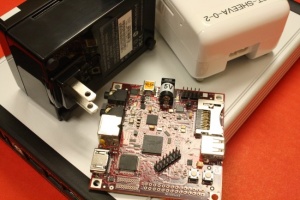From Fedora Project Wiki
| Line 35: | Line 35: | ||
* F15 (Work in progress) | * F15 (Work in progress) | ||
** [[Architectures/ARM/Fedora15 HardFP Bootstrap|Fedora 15 Hardware Floating Point Bootstrap]] | ** [[Architectures/ARM/Fedora15 HardFP Bootstrap|Fedora 15 Hardware Floating Point Bootstrap]] | ||
** [[/F15_Koji_build|Building F15 in koji]] - progress and outstanding tasks | |||
** Virtual Fedora Activity Days (VFADs) take place every Friday to continue bootstrap of armv7hl ("hardfp") F15. Join IRC at 10:00am EDT, or participate at any time following the bootstrap instructions. | ** Virtual Fedora Activity Days (VFADs) take place every Friday to continue bootstrap of armv7hl ("hardfp") F15. Join IRC at 10:00am EDT, or participate at any time following the bootstrap instructions. | ||
** Latest VFAD: [[Architectures/ARM/Fedora15 HardFP Bootstrap Virtual FAD 20110715|July 15 2011 Bootstrapping Fedora Activity Day]] - Yum is working in the F15 rootfs, work begins on mock support (see mailing list for todos). | ** Latest VFAD: [[Architectures/ARM/Fedora15 HardFP Bootstrap Virtual FAD 20110715|July 15 2011 Bootstrapping Fedora Activity Day]] - Yum is working in the F15 rootfs, work begins on mock support (see mailing list for todos). | ||
Revision as of 15:58, 27 September 2011

Introduction
ARM chips are the most widely-produced processor family in the world; they have historically been used in cell phones and embedded applications, and are increasingly used in tablet devices and low-power-consumption servers.
The Fedora-ARM project is an initiative to bring Fedora to this processor family.
Communication
- Mailing list: arm@lists.fedoraproject.org (archives)
- IRC: #fedora-arm on Freenode
Resources
Detailed information on Fedora-ARM:
- Running Fedora-ARM on your ARM device, or through emulation on your PC
- Information for Fedora package maintainers on getting your packages to work on ARM
- Information for Fedora-ARM team members (and prospective team members!) plus developers
- How to get an armv5tel cross toolchain installed on your x86 Fedora host
- How to build a kernel and cross-compile for ARM
- Building and Installing a Fedora Kernel Package on ARM Systems
- Various tips and hacks to improve Fedora ARM performance
Releases
- F14 (Alpha)
- F13 (Alpha)
- Fedora 13 Beta 3 release for ARM (latest)
- Fedora 13 Beta 2 release for ARM (obsolete)
- Fedora 13 Beta 1 release for ARM (obsolete)
- F12
Development
- F15 (Work in progress)
- Fedora 15 Hardware Floating Point Bootstrap
- Building F15 in koji - progress and outstanding tasks
- Virtual Fedora Activity Days (VFADs) take place every Friday to continue bootstrap of armv7hl ("hardfp") F15. Join IRC at 10:00am EDT, or participate at any time following the bootstrap instructions.
- Latest VFAD: July 15 2011 Bootstrapping Fedora Activity Day - Yum is working in the F15 rootfs, work begins on mock support (see mailing list for todos).
